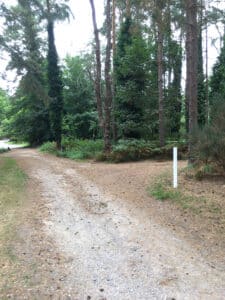Support us from £3/month
We deal with almost 1000 cases a year assisting communities, groups and individuals in protecting their local spaces and paths in all parts of England and Wales. Can you help us by joining as a member?
We have welcomed the decision of an inspector to refuse consent for a new works-compound on Chobham Common in Surrey.

The proposed works would have been in the trees on the right, which is registered common land. Photo: OSS
The works were proposed by Sunningdale golf club, for which an application for consent was made under section 38 of the Commons Act 2006. Sunningdale new course lies largely on Chobham Common, whereas the old course lies generally on other land further north. The works were intended to replace an existing nearby compound, also partly on the common. The society objected to the club’s application, on the grounds that there was no need for the compound to encroach on the common.
The inspector, acting on behalf of the Secretary of State for the Environment, Food and Rural Affairs, found that the new compound would ‘cause harm to the conservation of the landscape’, and did not need ‘to be located within the common land to the extent proposed’. He found the new buildings would have ‘a lasting impact’, and he was not convinced that the proposal could not be ‘undertaken with less or no adverse effect on the common’.
Commenting on the decision, Hugh Craddock, a case officer for the society, said: ‘It was right to refuse this application. The golf club—despite legal representation by Clarke Willmott LLP—failed to explain why the new compound, although partly accommodated on the old course land, could not wholly be built there. We suggested a suitable site, but the golf club failed to engage with us.
‘The golf club said that the old compound would be removed from the common, and this was a benefit which could be taken into account. We objected that there was no evidence the existing compound had the consent of the Secretary of State, and the club should not claim credit for the removal of buildings which ought not to have been built in the first place. Ludicrously, the club asserted that the new course was not common land at the date the original buildings were put up, even though ten minutes spent in the club’s own library would have set the club straight on the origins of the new course.
‘Instead, the club suggested that a right to graze “three horses or cattle or pigs and 24 head of poultry” might have been acquired over the by-then-existing new course through long indulgence. We think that Sunningdale golf club must be the only course in the country to claim to have tolerated pigs rooting around on the greens over a period of 20 years or more.’
Hugh added that the society was not wholly satisfied with the decision to refuse. ‘We are concerned that the inspector appeared to accept that the club could not build on the land forming the old course, because it is leased. But we were given no evidence why that was so, and we do not accept that, even if there were difficulties with its landlord, this should allow the club to develop on the common instead.
The inspector also considered as satisfied the Secretary of State’s policy that consent should not be given for development on common land incompatible with its use as common land, because, he said, the use was for golf. But on that analysis, development as a supermarket car park would be consistent with its use for shopping. Club use is incompatible with public access, and no more worthy of respect than any other private use.’
Hugh concluded: ‘We are delighted with the refusal. But if the club seeks to make a new application with only modest amendments, we shall address these misunderstandings by the inspector with renewed vigour.’
